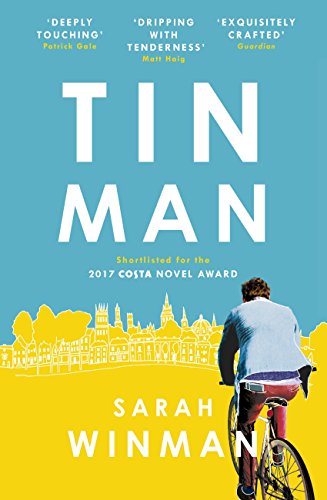She told me that she'd once asked Ellis if we'd ever kissed. She said he looked at her, trying to fathom out what she wanted him to say. After a while, he said, We might have once, but we were young. [p. 164]Ellis works in a car plant near Oxford, smoothing out dents in the metal. He's a solitary soul, mourning the deaths of his best friend Michael and his wife Annie. As a teenager he wanted to be an artist, but his father forbade it after his art-loving mother's death. Since then he's been hanging on in quiet desperation. Though his co-workers occasionally reach out to him, he doesn't want to get involved with anyone at all. He barely even engages with his own memories, his own experiences: he is not a man given to introspection. His dead wife is a constant presence in the house he shares.
Then Ellis acquires and reads Michael's journal, which recounts the years of Michael's disappearance from Ellis and Annie's lives. Until the death of Michael's grandmother, the three had been close friends: after that, Michael abandoned them, first for London and then for the South of France. It becomes clear from Michael's narrative just how much Ellis has refused to acknowledge about their relationship: he and Michael had been lovers, briefly, before Annie came along.
From one angle this is a love story set before and during the AIDS crisis. Michael is dying when he returns to Oxford, and has already watched one lover die. (I couldn't help wondering whether the car crash was an accident.) But from another angle I read it as a novel about fathers. Ellis' father has shaped his son's life, by ruthlessly quashing any 'artistic' or 'soft' impulses in Ellis. Michael's father, too, was a strong influence: finding his son dressing up in his departed mother's clothes, he behaves as though Michael has made some irrevocable choice and should henceforth be excluded from masculine activities such as football. (Notably, both men's mothers are absent. Michael's grandmother Mabel is a kind of mother to both: later, perhaps, so is Annie, who doesn't get a narrative of her own.)
I found the ending depressing. It seemed to me that Ellis was turning his back not only on the possibilities of his everyday life, but on the memories of Annie, choosing instead to revisit the place where Michael was happiest: choosing, instead, the relationship he spent so long denying.
This novel was greatly acclaimed, but it felt to me like a sentimental tragedy. Winman's writing is gorgeous and I was impressed by the contrast between Ellis' narrative and Michael's, and the recurring themes and images throughout. I will look out for her other novels, which I hope will be in happier modes.

No comments:
Post a Comment